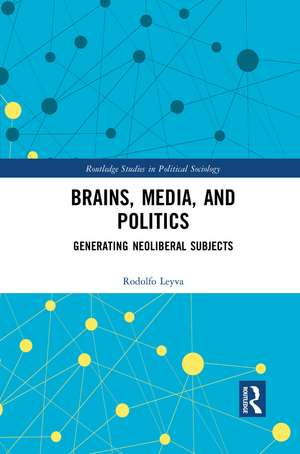Brains, Media and Politics: Generating Neoliberal Subjects: Routledge Studies in Political Sociology
Autor Rodolfo Leyvaen Limba Engleză Paperback – 30 iun 2021
| Toate formatele și edițiile | Preț | Express |
|---|---|---|
| Paperback (1) | 383.89 lei 6-8 săpt. | |
| Taylor & Francis – 30 iun 2021 | 383.89 lei 6-8 săpt. | |
| Hardback (1) | 764.20 lei 6-8 săpt. | |
| Taylor & Francis – 11 dec 2019 | 764.20 lei 6-8 săpt. |
Din seria Routledge Studies in Political Sociology
-
 Preț: 286.71 lei
Preț: 286.71 lei -
 Preț: 155.44 lei
Preț: 155.44 lei - 8%
 Preț: 390.30 lei
Preț: 390.30 lei -
 Preț: 396.29 lei
Preț: 396.29 lei - 17%
 Preț: 259.51 lei
Preț: 259.51 lei -
 Preț: 364.55 lei
Preț: 364.55 lei -
 Preț: 384.86 lei
Preț: 384.86 lei - 18%
 Preț: 264.98 lei
Preț: 264.98 lei -
 Preț: 187.68 lei
Preț: 187.68 lei -
 Preț: 360.14 lei
Preț: 360.14 lei -
 Preț: 383.04 lei
Preț: 383.04 lei -
 Preț: 348.77 lei
Preț: 348.77 lei -
 Preț: 342.13 lei
Preț: 342.13 lei - 17%
 Preț: 259.42 lei
Preț: 259.42 lei -
 Preț: 396.02 lei
Preț: 396.02 lei - 18%
 Preț: 1000.51 lei
Preț: 1000.51 lei - 18%
 Preț: 1000.27 lei
Preț: 1000.27 lei -
 Preț: 382.18 lei
Preț: 382.18 lei -
 Preț: 389.66 lei
Preț: 389.66 lei - 18%
 Preț: 1000.13 lei
Preț: 1000.13 lei - 18%
 Preț: 942.68 lei
Preț: 942.68 lei - 9%
 Preț: 935.22 lei
Preț: 935.22 lei - 9%
 Preț: 1003.54 lei
Preț: 1003.54 lei - 18%
 Preț: 992.85 lei
Preț: 992.85 lei
Preț: 383.89 lei
Nou
Puncte Express: 576
Preț estimativ în valută:
73.46€ • 78.55$ • 61.25£
73.46€ • 78.55$ • 61.25£
Carte tipărită la comandă
Livrare economică 17 aprilie-01 mai
Preluare comenzi: 021 569.72.76
Specificații
ISBN-13: 9781032083681
ISBN-10: 1032083689
Pagini: 216
Ilustrații: 13 Illustrations, black and white
Dimensiuni: 156 x 234 x 12 mm
Greutate: 0.31 kg
Ediția:1
Editura: Taylor & Francis
Colecția Routledge
Seria Routledge Studies in Political Sociology
Locul publicării:Oxford, United Kingdom
ISBN-10: 1032083689
Pagini: 216
Ilustrații: 13 Illustrations, black and white
Dimensiuni: 156 x 234 x 12 mm
Greutate: 0.31 kg
Ediția:1
Editura: Taylor & Francis
Colecția Routledge
Seria Routledge Studies in Political Sociology
Locul publicării:Oxford, United Kingdom
Public țintă
Postgraduate and UndergraduateCuprins
Introduction 1. Homo Economicus & The Neoliberal Society 2. Neoliberal Cognition, Subjectification, & Reproduction 3. Reproducing Neoliberalism in Everyday Life: A Cross-National Ethnographic Study 4. How New Media Help Generate Neoliberal Subjectivities: A Survey Study 5. Experimental Insights into Mass Media’s Cultivation of A Neoliberal Habitus 6. A Cognitive-Sociological Theory of Neoliberal Reproduction
Notă biografică
Rodolfo Leyva is a fellow in the Department of Media and Communications at the London School of Economics and Political Science, UK.
Recenzii
"Rudy Leyva shows, in a model of cumulative scholarship, that watching programmes glorifying materialism and the rich makes people more selfish, less critical of inequality, more punitive in their attitudes to welfare and less concerned with hyper-consumption. A fearless, crucially important and scary book - lucid and engagingly written too." - Ian Gough, Visiting Professor, CASE, LSE, UK; author of Heat, Greed and Human Need.
Descriere
This book combines leading theories from sociology, media-communications and cognitive science, and draws on a unique mix of qualitative and quantitative evidence to provide a nuanced account of how the cognitive dimensions of people’s everyday social practices contribute to the macro processes of neoliberal reproduction.
